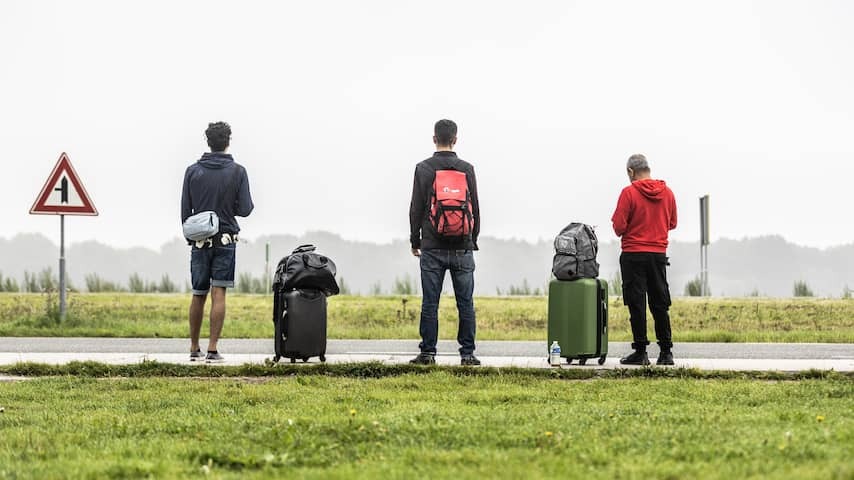
It is becoming more difficult for Syrians to obtain a residence permit in the Netherlands. According to outgoing minister David van Weel, Syria is safer since the fall of the regime of Bashar Al Assad. But according to experts, this conclusion is premature.
From now on, a Syrian must be able to prove that the situation in Syria is unsafe for him or her to obtain a residence permit. This is certainly still the case for people from the LGBTQIA+ community and Alawites, writes Van Weel (Asylum and Migration) in a letter to the House of Representatives. The Alawites are a religious minority group, to which Al Assad also belongs.
For other Syrians, the country would be safe enough. That is why the Netherlands is adjusting its national policy. This means that the Immigration and Naturalisation Service (IND) will soon be able to reject more current and new asylum applications from Syrians.
The cabinet is taking a big risk with this, according to Ali Hamdan. He is a university lecturer in political science at the University of Amsterdam and specializes in the geopolitics of Syria. “People’s lives may be at stake,” he tells NU.nl.
Although there are indeed improvements in Syria, according to Hamdan it is too early to draw a conclusion about the safety of Syrians. “The government, led by HTS, is not playing an open hand. For example, we know very little about the internal security services and who exactly is in them. We only know that many different groups with different backgrounds are integrated into the government apparatus.”
According to him, a number of these groups were involved in the deadly fighting with the Alawites in the coastal regions of Latakia and Tartous in March. More than a thousand people are said to have died in two days, mainly civilians.
What is HTS?
Hay’at Tahrir Al Sham (HTS) has played an important role in overthrowing the dictatorial regime of Al Assad. The rebel movement, which originates from Al Qaeda, now has power in large parts of Syria.
HTS creates the image for the outside world that it is less radical than other rebel groups. It would also strive for justice and equality. “But in reality, they are seizing all the power,” journalist Hisham Arafat previously told NU.nl.
Crime, violence and chaos
In addition, it is still very unsafe for citizens in Syria. There is a lot of crime, violence and chaos on the streets, says Syrian-Kurdish journalist Hisham Arafat. The situation has deteriorated, especially for minorities. In addition to the Alawites, these include Christians, Druze and Kurds. “They often live together in certain neighborhoods or areas. Attacks take place there regularly.”
But the majority group, which consists of Arab Muslims, is also a victim of violence. “The violence against them is no longer systematic and targeted, as it was under the Al Assad regime. But that does not mean that they are safe,” says Arafat. For example, they can also become victims of street violence or cannot make political statements.
Mohammad Kanfash, Syria researcher and PhD student at the Center for Conflict Studies at the University of Utrecht, adds: “In northeastern Syria there is sometimes fighting between the Kurdish group SDF and the Syrian army. So people are in danger there.” It is also very restless in the south of the country due to the flaring attacks by Israel.
‘Fleeing is very personal’
Arafat speaks of a “generalizing decision” by the outgoing cabinet to label Syria as safer. “Because it is theoretically safer for some, but that safety cannot really be guaranteed for anyone.”
The experts therefore hope that the IND will continue to pay enough attention to the individual situation of escaped Syrians. “Fleeing is very personal,” says Kanfash. “Everyone does it for a different reason. People pay 15,000 to 20,000 euros to travel an extremely dangerous route to the Netherlands. They really don’t do that for nothing.”
The Ministry of Asylum and Migration also acknowledges that the situation in Syria is not yet stable. That is why civil servants are closely monitoring the situation in the country, the ministry writes in Van Weel’s letter. If the situation changes, the IND will take this into account in its assessment.
‘Policy is not compatible’
In addition to a stricter admission procedure, the cabinet also wants to see whether temporary residence permits for Syrians can be revoked. But the situation in Syria is not good enough for that yet, writes Van Weel.
This was also evident last week from an official report on the country. It states, among other things, that nowhere in Syria has been really safe in recent months.
According to Refugee Work Netherlands, it is therefore incompatible that the minister does determine that new and current asylum applications can be rejected. “The outgoing cabinet is too premature in this decision. There are still several active armed conflicts in the country. Violence levels change and the picture can vary per area and per week.”
In addition, the refugee organization points out that the humanitarian situation in Syria is very bad. For example, 90 percent of Syrians are said to live below the poverty line. Schools, hospitals, roads and water and electricity facilities have been damaged. Many houses are also in ruins. That makes it dangerous for “already vulnerable people” to return.